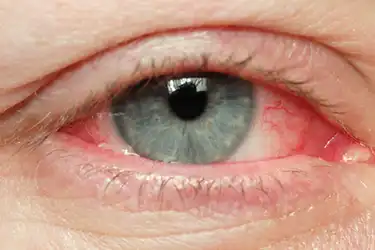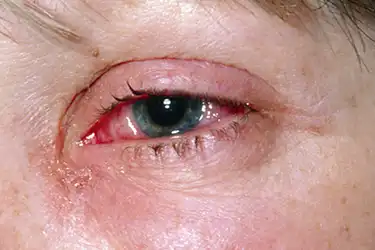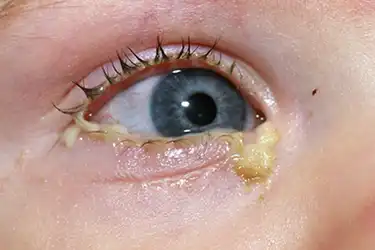How Can You Tell if Pink Eye Is Viral or Bacterial?
Slideshow: Pinkeye (Conjunctivitis) -- Causes, Symptoms, & Treatments

What Is Pinkeye?
1 / 17
Pinkeye -- also chosen conjunctivitis -- is redness and inflammation of the clear membranes roofing the whites of the optics and the membranes on the inner part of the eyelids. Pinkeye is most often caused by a virus or by a bacterial infection, although allergies, chemical agents, and underlying diseases tin can also play a function.

Is Pinkeye Contagious?
two / 17
Viral and bacterial pinkeye are extremely contagious. Information technology's easily spread through poor manus washing or past sharing an object (similar a towel) with someone who has it. Information technology tin also spread through coughing and sneezing. Kids diagnosed with infectious pinkeye should stay out of school or day care for a brusk menses of time. Allergic pinkeye (caused by, for instance. seasonal pollens or animal dander) and chemic pinkeye (from chemicals or liquids, including bleach and furniture smoothen) are not contagious.

Symptom: Eye Redness
3 / 17
Redness of the heart is the typical, telltale symptom of pinkeye. Pinkeye is a common condition that is rarely serious and unlikely to cause long-term eye or vision damage if promptly detected and treated.

Symptom: Swollen, Red Eyelids
4 / 17
The symptoms of infectious pinkeye typically begin in ane heart and involve the other heart inside a few days if it'southward acquired past leaner. If the crusade is viral, symptoms start in both eyes at the same fourth dimension. Symptoms of allergic pinkeye usually involve both eyes and almost always includes itching. Swelling of the eyelids is more common with bacterial and allergic pinkeye.

Symptom: Lots of Tearing
5 / 17
Viral and allergic pinkeye are known for causing more tear production than usual.

Symptom: Itchy or Burning Eyes
six / 17
You would know it if you felt it -- that overwhelming itchy, burning feeling in the eyes, which is typical of pinkeye.

Symptom: Drainage from the Eyes
7 / 17
A clear, watery drainage is common with viral and allergic pinkeye. When the drainage is more greenish-yellow (and there'due south a lot of it), this is likely bacterial pinkeye.

Symptom: Crusty Eyelids
viii / 17
If you wake upwards with your eyes "stuck shut," this may be acquired by the discharge that accumulates during sleep from pinkeye.

Symptom: Sensitivity to Light
9 / 17
Pinkeye can cause mild sensitivity to light. A person who has severe symptoms, such as changes in eyesight, severe calorie-free sensitivity, or severe hurting may have an infection that has spread across the conjunctiva. Information technology's also possible that the person has a more serious infection or inflammation inside the eye. In either case, the status should be examined by a doctor.

Symptom: 'Something in the Centre'
10 / 17
You may find a bothersome feeling like something is stuck in your eye. Or, a child may draw the feeling as sand in the heart.

Pinkeye Diagnosis
xi / 17
A doctor can often diagnose pinkeye just by its distinguishing signs and symptoms. Nonetheless a slit lamp examination may exist required. In some cases, a swab of the belch from the heart is sent to a lab to determine the cause.

When Pinkeye Means Something More
12 / 17
Persistent pinkeye could be from a astringent allergy or infection that needs treatment. Also, the eyelid could be irritated chosen blepharitis, or the cornea called dry centre. Rarely, it is a sign of an disease in the body like rheumatoid arthritis, systemic lupus erythematosus (lupus), or inflammatory bowel diseases, such as ulcerative colitis and Crohn's illness. Pinkeye is also seen in Kawasaki disease - a very rare disease associated with fever in infants and young children.

Treating Pinkeye
13 / 17
Bacterial pinkeye is treated with antibiotic eyedrops, ointment, or pills to articulate the infection. Most viral pinkeye cases have no specific treatment -- you only take to let the virus run its course, which is normally 4 to 7 days. Allergic pinkeye symptoms should meliorate once the allergen source is removed and the allergy itself is treated simply can get relief with antihistamines. Chemical pinkeye requires prompt washing of the affected eye(s) for 5 minutes and an immediate telephone call to the dr..

Easing Symptoms
14 / 17
To reduce pain and to remove the discharge of bacterial or viral pinkeye, utilise a cold or warm compress on the eyes. Brand sure to use a dissimilar washcloth for each center to prevent spreading any infection. And use clean washcloths each time. Clean the eye from drainage past wiping from the inside to the outside of the center expanse.

How Long Am I Contagious?
15 / 17
With bacterial pinkeye, you lot tin usually return to work or school 24 hours after antibiotics take been started, as long as symptoms have improved. With viral pinkeye, you are contagious as long as the symptoms last. Check with your doctor to be certain.

Preventing Its Spread
16 / 17
If you or your child has infectious pinkeye, avoid touching the heart surface area, and wash your hands ofttimes, peculiarly subsequently applying medications to the surface area. Never share towels or handkerchiefs, and throw away tissues after each apply. Change linens and towels daily. Disinfect all surfaces, including countertops, sinks, and doorknobs. Throw away any makeup used while infected.
1 / 17
IMAGES PROVIDED Past: (1) Holly Sisson / iStockphoto REFERENCES: Cleveland Dispensary: "Conjunctivitis." Nemours Foundation. KidsHealth.org: "Pinkeye (Conjunctivitis)." Centers for Disease Command and Prevention: "Conjunctivitis. " American Academy of Ophthalmology "Conjunctivitis: What is Pinkish Center?" Show Sources
(2) Stockxpert / Jupiter Images
(three) iStockphoto
(iv) Stacy Barnett / iStockphoto
(5) Getty Images
(6) Dr. P. Marazzi / Photo Researchers, Inc.
(7) Dr. P. Marazzi / Photo Researchers, Inc.
(8) Dr. P. Marazzi / Photo Researchers, Inc.
(ix) Imagewerks / Getty Images
(10) Getty Images
(11) Ned Frisk / Blend Images / Photolibrary
(12) Michelle Del Guercio / Photo Researchers, Inc.
(13) Getty Images
(14) © Doable / amanaimages / Corbis
(15) Paul Burns / Alloy Images / Photolibrary
(16) Stockxpert / Jupiter Images
macdonnellfruck1991.blogspot.com
Source: https://www.webmd.com/eye-health/ss/slideshow-pinkeye